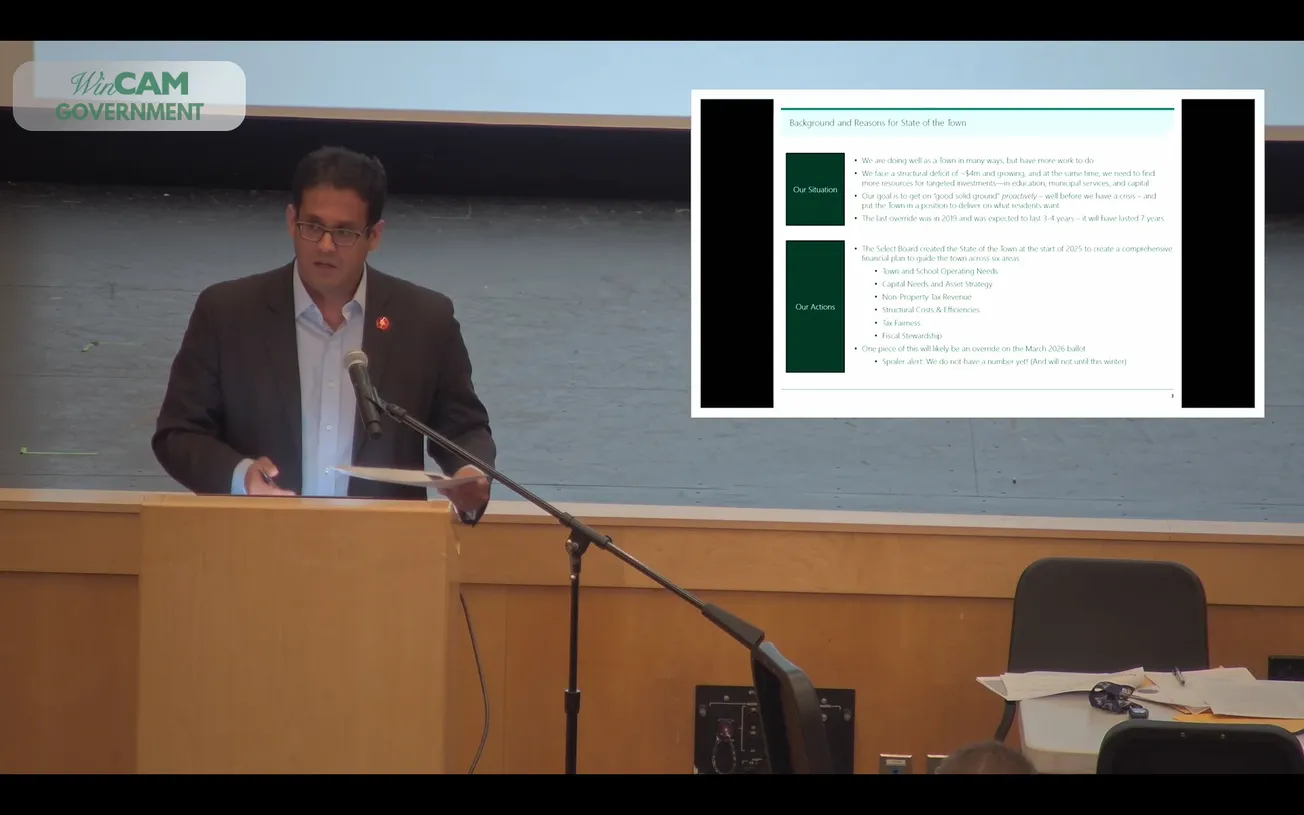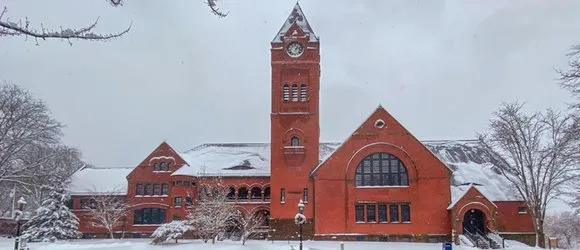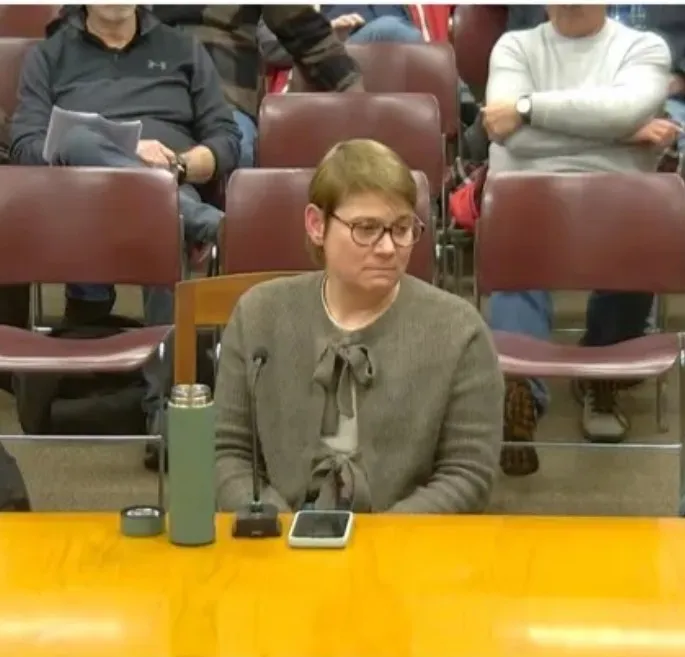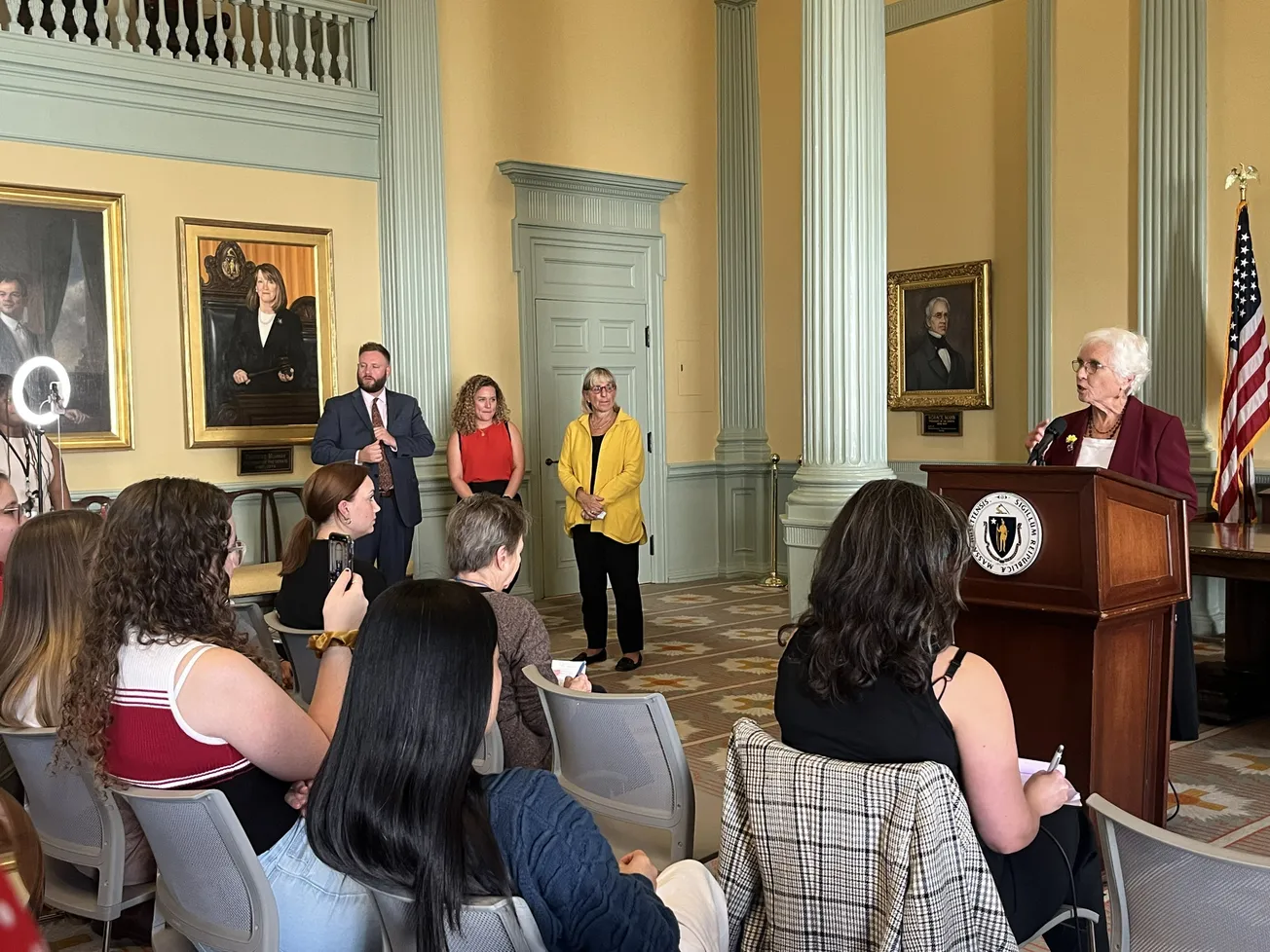Table of Contents
Winchester Town Meeting members approved $4.4 million in capital appropriations Monday night while receiving sobering warnings about a looming structural deficit and hearing updates on the town’s newly secured climate leader status and ongoing search for a permanent town manager.
The opening session of Winchester’s Fall 2025 Town Meeting at Winchester High School auditorium saw Town Moderator Philip Frattaroli guide members through committee reports, zoning amendments and 19 capital projects ranging from a $2.15 million school chiller replacement to traffic calming measures that sparked debate among residents.
Capital projects total $4.4 million
The night’s largest single appropriation was $2.15 million from the building stabilization fund for Lincoln Elementary School’s failed 24-year-old chiller and rooftop HVAC unit.
School Committee member and Capital Planning Committee member Stefanie Mnayarji noted the system will be replaced with a new air source heat pump, positioning the project as a candidate for future decarbonization grants.
Capital Planning Committee Chair Roger McPeek described the portfolio as “unsexy but unavoidable.” Town Hall has not undergone major renovation in 35 years and requires $8.5 million in HVAC work that cannot be funded through current stabilization accounts.
Other approved projects included $300,000 for preliminary design of Symmes Corner traffic improvements, with Massachusetts promising to fund construction if Winchester completes design and permitting; $100,000 for underground fuel tank removal at the library and public safety building; and $150,000 for Kenwin Road traffic calming measures including chicanes.
The Kenwin Road project sparked the evening’s most extensive debate, with residents disagreeing about whether speed or volume posed the primary safety concern on the cut-through corridor.
The measure passed 104-32 after Town Engineer Matt Shuman reported temporary installations reduced average speeds one to two miles per hour and decreased vehicles traveling above 30 miles per hour by 10%.
Other capital appropriations included vehicles for the health, recreation and highway departments; voting machine replacements; playground upgrades at Mystic Elementary School; police Taser replacements; backstop and fence repairs at multiple fields; and $650,000 for roads and sidewalks, including $300,000 in free cash to replenish funds used for Shore Road culvert overruns.
Deficit looms despite strong credit rating
Finance Committee Chair Derek Ross told the meeting that Winchester faces an anticipated operational deficit of $3 million to $5 million in coming fiscal years, driven largely by expenses that outpace revenue growth.
Ross said about 95% of Winchester’s $165.7 million budget — roughly $157 million — comes from residential property taxes, compared with a statewide average of 85%. The town’s commercial tax base, he added, generates only about $8 million to $9 million a year, between 20% and 75% less than in comparable Massachusetts communities.
Despite these pressures, Winchester maintains a AAA bond rating from Moody’s, one of only 14 Massachusetts communities with that distinction. The town’s free cash reserves remain sufficient to support emergency needs, and Winchester is less leveraged than many peer communities.
Ross emphasized the importance of prudent financial management. Free cash usage has increased year over year for roof repairs, schools and tax relief, placing growing pressure on reserves as the town continues operating with deficits.
Climate leader designation unlocks grant funding
Rick Eno, chair of the Climate Action Advisory Committee, announced Winchester received official designation as a climate leader from Massachusetts at 5:57 p.m. Monday, just minutes before Town Meeting convened.
The designation makes Winchester eligible for up to $1 million in grant funding every three years for decarbonization efforts. Achieving climate leader status required five major accomplishments: adopting a climate action plan, establishing an implementation committee, passing a specialized energy code, appointing a School Committee liaison and approving decarbonization and electric vehicle plans.
Eno reported the town has completed or is on track with 50% of 69 specific actions in its 2020 Climate Action Plan, which aims to reduce carbon emissions 80% by 2050 and increase climate resilience. Winchester has secured $3.7 million in climate-related grants and incentives over the past four years.
The Lynch Elementary School, which opened in September, benefited from more than $3 million in incentives due to its climate footprint as the town’s first net zero building powered by solar panels.
Town manager search continues
Select Board Chair Michelle Prior reported the search for a permanent town manager is underway following Beth Rudolph’s retirement in September. Acting Town Manager Stephen Delaney is serving during the transition. A screening committee is reviewing resumes, with interviews expected before the Select Board in December.
Pryor highlighted $1.6 million in grants secured over the past two years, including funding for an aerobic digester at the transfer station, windows at Muraco Elementary School and solar panels at Lynch Elementary School. Summer improvements included repaving Main Street and the Town Hall parking lot, updating playgrounds at McDonald, Leonard and Lincoln fields, and completing the new Lynch playground.
School Committee reports progress
School Committee Chair Karen Maruyama Bolognese outlined district priorities for the next five years, emphasizing literacy, mathematics, professional development and safety and security. The committee is running two literacy pilot programs this year at all five elementary schools, with full implementation planned for fiscal 2027 pending a March 2026 recommendation.
Bolognese showcased recent improvements: a new cafeteria, reconfigured library, fresh paint and vinyl tiles at Muraco Elementary School through the life extension plan; roof repairs at McCall and Ambrose elementary schools; and the reopened Winchester High School gymnasium with four regulation hardwood basketball courts, pickleball lines and new bleachers.
Of the Class of 2025, 95% enrolled in four-year colleges and universities, with 90% attending one of their top three choices. Seven students achieved national merit semifinalist status.
The State of the Town Committee maps fiscal future
Select Board member Paras Bhayani, co-chair of the State of the Town Committee with Select Board Chair Michelle Prior, outlined the comprehensive financial planning process. The committee, with 25 members working across 19 distinct work streams, is examining operating needs, capital requirements, asset strategy, revenue sources, structural costs and tax fairness.
The committee has produced hundreds of pages of analysis and more than 20 financial models. Bhayani emphasized the last operating override in 2019 was designed to last three to four years but has stretched to seven through conservative financial management.
The committee meets most Fridays at Town Hall, with meetings open to the public. A final recommendation on potential override amounts is not expected until late 2025 or early 2026.
MBTA housing zoning amended
Town meeting approved by a vote of 154-1 amendments to the MBTA Overlay District Zoning to align affordable housing requirements with existing rules in the center business district and Main Street mixed use district.
Planning Board Chair Brian Vernaglia explained the changes reduce the threshold for affordable units from 10 to six dwelling units and modify rounding methods.
Previously, developments with nine units in the Main Street or center business districts required one affordable unit, while the same project in the MBTA overlay required none. A 35-unit development would generate six affordable or workforce units under the aligned rules versus four under the previous MBTA overlay formula.
The amendments received unanimous support from the Select Board, Housing Partnership Board and Affordable Housing Trust. Housing Partnership Board chair John Suhrbier noted the six-unit threshold with conventional rounding represents good practice throughout eastern Massachusetts and has proven feasible for developers.
Heritage district expanded
Town Meeting unanimously approved adding 2A Rangeley Ridge to the Rangeley Park Heritage District, bringing the total to 20 properties in the district.
The committee’s chair, Jill Chiara, explained the district preserves defining features of homes in the neighborhood tucked behind Church and Central streets, dating to the 1880s when it was known as Rangeley Park.
Robert's Rules study recommends changes
Former moderator Peter Haley, chair of a summer study committee, recommended Winchester adopt Town Meeting Time in place of Robert’s Rules of Order to govern proceedings.
Haley said Town Meeting Time, written by lawyers experienced with New England town meetings, provides a more accessible narrative explanation of parliamentary procedures than Robert’s Rules.
The recommendation will require bylaw supplements and likely will come before a future Town Meeting for formal adoption.
Looking ahead
Frattaroli adjourned the session near 10 p.m. Town meeting resumes Thursday with articles addressing personnel matters, retiree cost-of-living adjustments and the first allocation of Community Preservation Act funds.
Select Board Vice Chair Anthea Brady announced plans to propose a Human Rights Commission at the Spring 2026 Town Meeting.
Capital Planning Committee members noted the five-year capital projection now exceeds $100 million, though that figure includes $20 million in downtown improvements likely requiring outside funding. Fire equipment needs over the next two years total $2.5 million.
The committee has set aside $1 million toward those purchases.
The School Committee and Select Board voted to support demolition of the Sanborn Carriage House, pending a Historic Commission delay period, with funding expected at Spring Town Meeting.
Will Dowd is a Massachusetts journalist who covers municipal government and community life for Winchester News. He previously co-founded the Marblehead Current and now runs The Marblehead Independent, a reader-funded digital newsroom.







